SWC: SA's proudest moment

This is really our time to shine, and we can't afford to focus on the small things. Comment by Sport24's World Cup Editor Andrew Young.
As we South Africans reflect and come to terms with the reality that our beloved (for some, newly so) Bafana Bafana face the real prospect of a group stage exit, the question we should all be asking is not: “why did the team fail”, but rather: “how has this country succeeded?”
I remember as a young man celebrating the Springbok Rugby World Cup victory in 1995. This fragile country, newly acclimatized to ‘freedom’, had suddenly found the ideal catalyst to bring its still divided people together – or at least that’s what it felt like to me. It was such a huge moment in my life, and I can recall every last second of the dying minutes: Joel’s drop goal, the final whistle, the total ecstasy.
But my perspective was a narrow one, that of a young, white male in a comfortable, white world, with mainly white friends – celebrating a rugby win came as second nature.
In retrospect, it has dawned on me that, although it was a great win, by a great team, for a great country, the majority of the people hooting and flag waving and dancing in Long Street with me were white. Statistics are a liability, but I would guess that at least 85% of the jubilant crowds at the time supported this demographic, and maybe that’s just the way things were back then.
The World Cup in 2010 feels different in almost every sense. South Africa suddenly feels so much more united – and yes, of course there are nay-sayers, and of course there are the fickle few that will stuff their Bafana shirts into the bin, and of course there will be problems.
Despite this, for once, this is about the whites in South Africa choosing of their own free will to invest their hearts and souls into what was traditionally a ‘black’ sport, this is about breaking down barriers of understanding that curbed real integration, this is about nation building in its truest sense.
Ask yourself: what does “Ayoba” mean? What is a vuvuzela? Where is Soccer City? How much more familiar do these words, items and places feel to you? From almost nowhere in ‘white consciousness’, they have become part of everyday language, of everyone’s experience, and inextricably part of the South African World Cup.
Football has gone from being a township sport to a reason to get together, to share, talk, debate and celebrate (or commiserate!) regardless of background or race.
And it started months ago with genius initiatives: the Super 14 rugby in Soweto, the street parades, Football Friday, flags on wing mirrors, and then the big moment, the opening match in Soccer City.
I have never felt prouder of my country. We’re hosting the world’s biggest event, and we’re doing it with style. So I say, forget the problems, forget the possibility of Bafana being knocked out – nothing can take away from us the absolute thrill that every South African must have felt when Siphiwe Tshabalala blasted home the first goal of the tournament.
Where were you when that happened? I know where I was, and I know that for me, that goal will live in my mind for as long as I live. But more importantly, I know that more South Africans than ever before will have the same memory, the same thrill and the same reason to be proud of what we’ve achieved.
The end goal is to take South Africa to the world, the fact that Bafana Bafana may not lift the Cup, or see the last 16 is actually dwarfed by the magnitude of that task, and the way to achieve it is to keep smiling, keep positive, and keep showing how far we’ve come as a nation.
Disclaimer: Sport24 encourages freedom of speech and theexpression of diverse views. The views of columnists and writers published onSport24 are therefore their own and do not necessarily represent theviews of Sport24.
Copyright News24.com. Reprinting is not allowed without express, written permission.
 0
0 







Go to Forum >>0 Comments